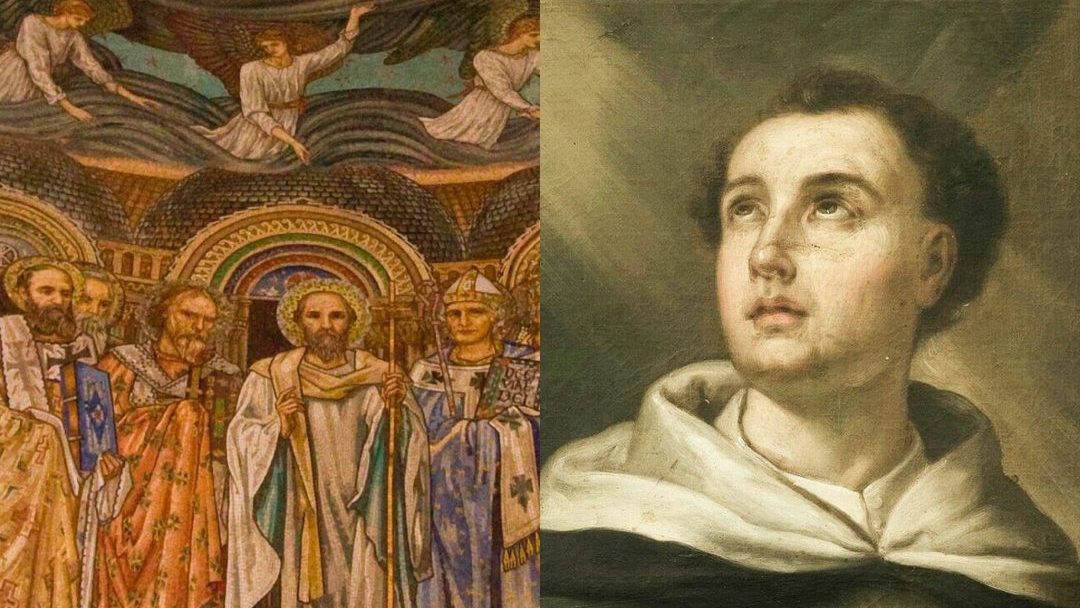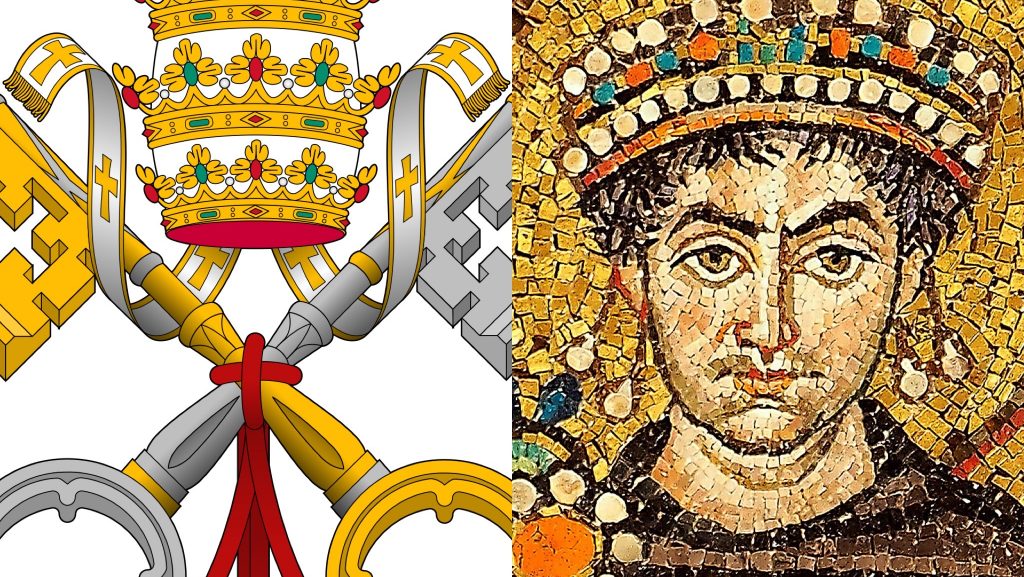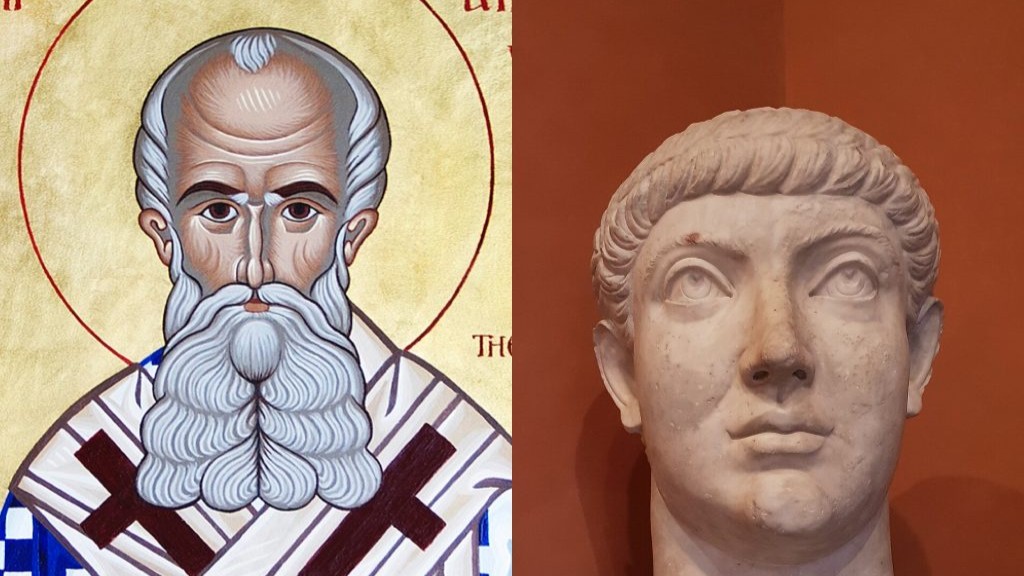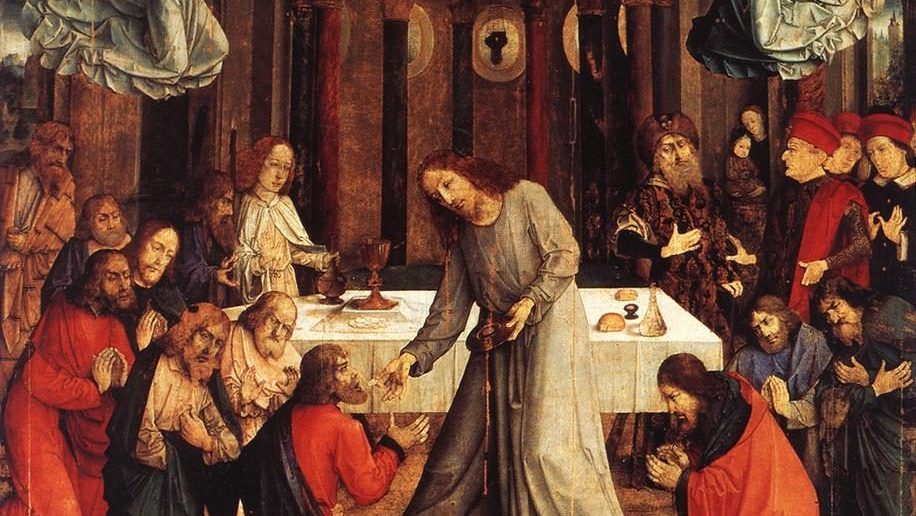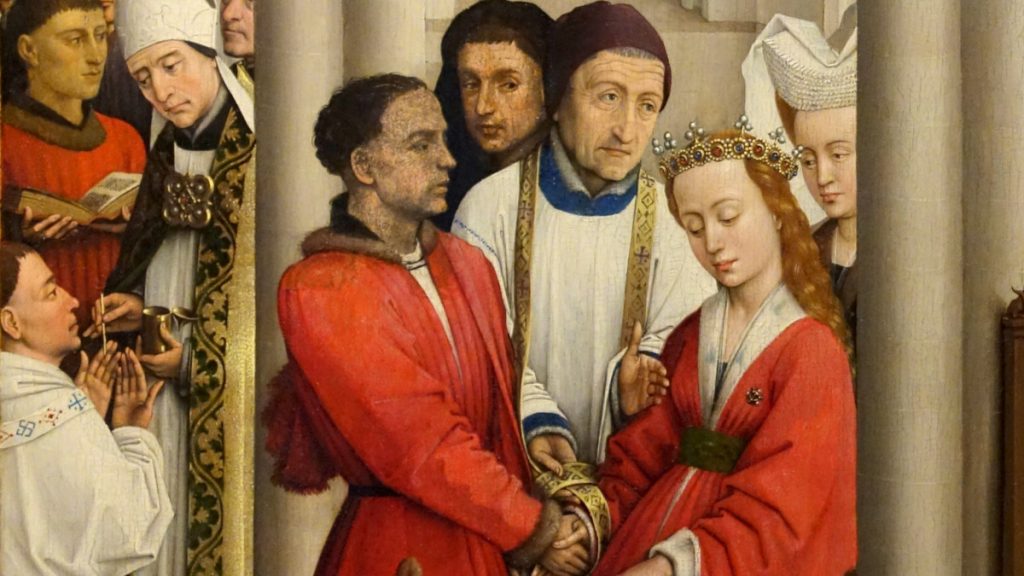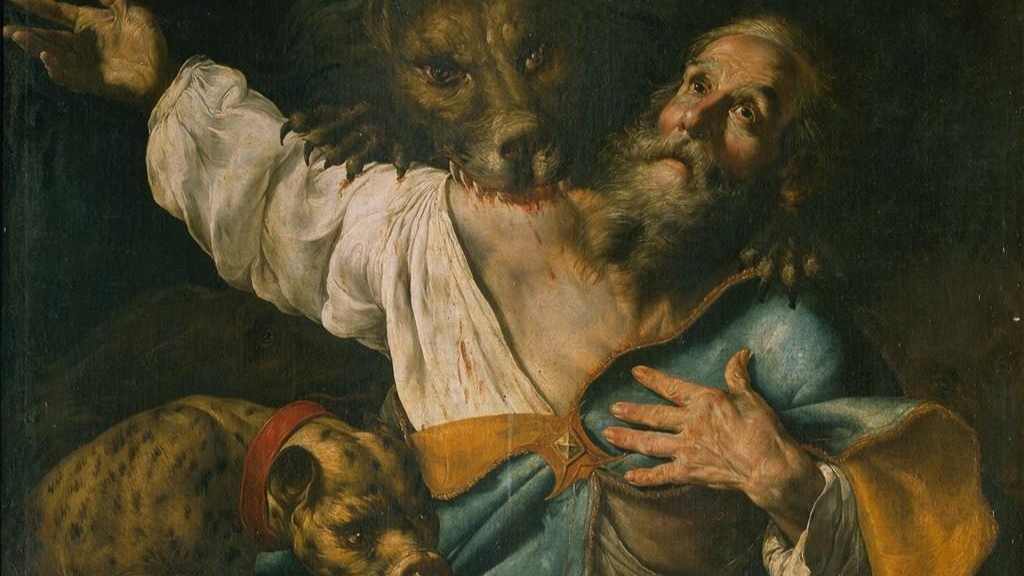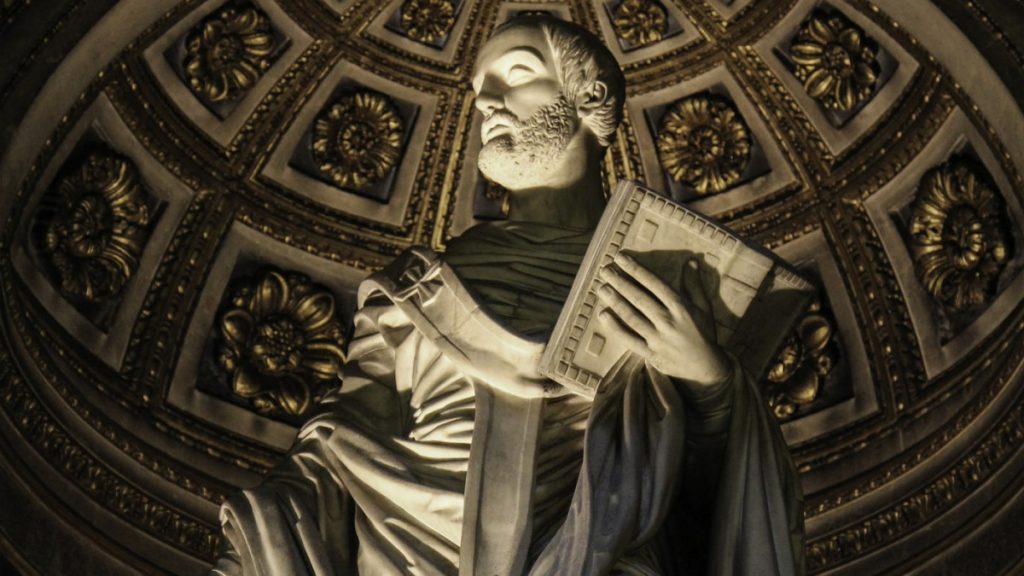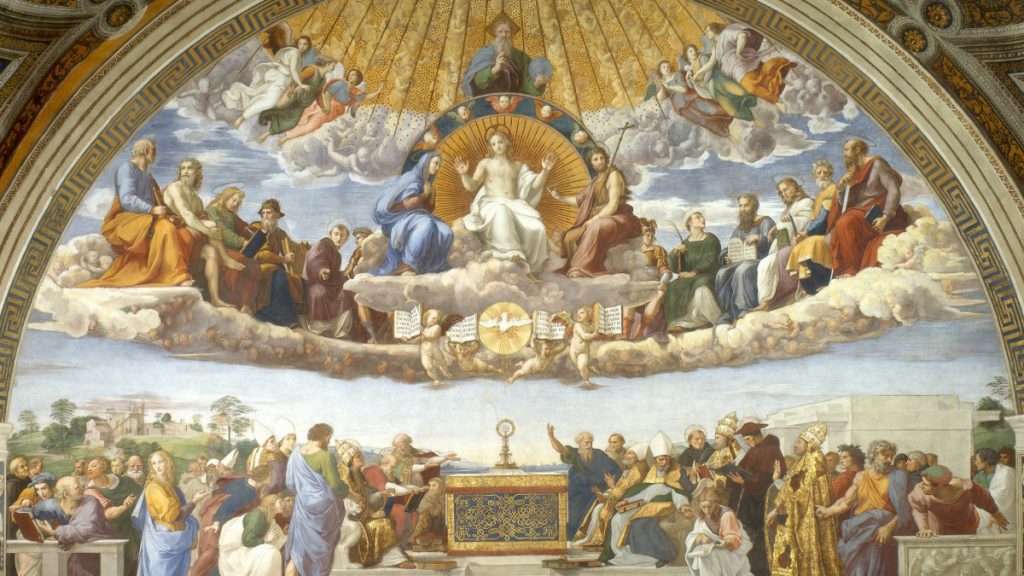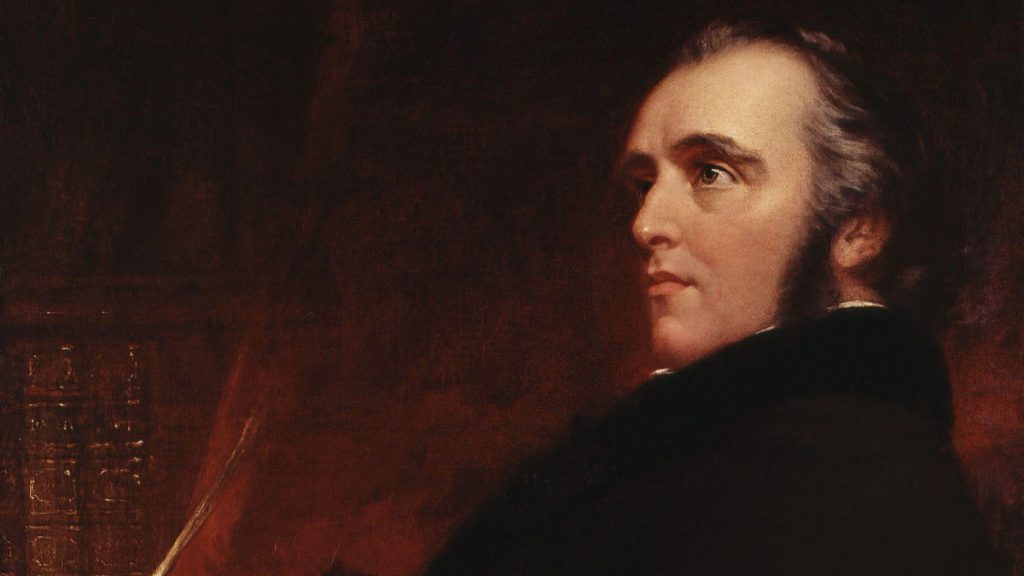(Updated June 21, 2025)
This Quote Archive is a collection of authoritative Church teaching on the preeminent authority of the Church Fathers, and St. Thomas Aquinas, often known as the “Angelic” and “Common Doctor” (meaning, for all) of the Church.
Perhaps the best summary of sources ever written on this topic with respect to St. Thomas was authored by Santiago Ramirez, OP, The Authority of St. Thomas Aquinas (1952).
This Quote Archive will continue to be updated as more sources are found.
We are grateful to our friend, colleague, and Eternal Christendom Advisory Board Member Dr. Alan Fimister, for helping inspire this Quote Archive.
List of Citations
- Ecumenical Council of Trent, Session 4, Decree Concerning the Canonical Scriptures (April 8, 1546)
- Pope Pius IV, Professio fidei Tridentina: Creed of Pope Pius IV (November 13, 1565)
- Ecumenical Council of Vatican I, Session 3, Dogmatic Constitution on the Catholic Faith (April 24, 1870)
- Pope Leo XIII, Aeterni Patris: On the Restoration of Christian Philosophy (August 4, 1879)
- St. Pope Pius X, Pascendi Dominici Gregis: On the Doctrines of the Modernists (September 8, 1907)
- Code of Canon Law (1917)
- Pope Pius XI, Studiorum Ducem: On St. Thomas Aquinas (1923)
- Pope Pius XII, Humani Generis (August 12, 1950)
- Code of Canon Law (1983)
Ecumenical Council of Trent (1545-1563)
Session 4, Decree Concerning the Canonical Scriptures (April 8, 1546)
Decree Concerning the Edition and Use of the Sacred Books
Furthermore, to check unbridled spirits, it decrees that no one relying on his own judgment shall, in matters of faith and morals pertaining to the edification of Christian doctrine, distorting the Holy Scriptures in accordance with his own conceptions, presume to interpret them contrary to that sense which holy mother Church, to whom it belongs to judge of their true sense and interpretation, has held and holds, or even contrary to the unanimous teaching of the Fathers, even though such interpretations should never at any time be published.
Pope Pius IV, Professio fidei Tridentina: Creed of Pope Pius IV (November 13, 1565)
I also accept the Holy Scripture according to that sense which holy mother the Church hath held, and doth hold, and to whom it belongeth to judge the true sense and interpretations of the Scriptures. Neither will I ever take and interpret them otherwise than according to the unanimous consent of the Fathers.
Ecumenical Council of Vatican I (1870)
Session 3, Dogmatic Constitution on the Catholic Faith (April 24, 1870)
Chapter 2: On Revelation (Par. 8-9)
8. Now since the decree on the interpretation of Holy Scripture, profitably made by the Council of Trent, with the intention of constraining rash speculation, has been wrongly interpreted by some, we renew that decree and declare its meaning to be as follows: that in matters of faith and morals, belonging as they do to the establishing of Christian doctrine, that meaning of Holy Scripture must be held to be the true one, which Holy mother Church held and holds, since it is her right to judge of the true meaning and interpretation of Holy Scripture.
9. In consequence, it is not permissible for anyone to interpret Holy Scripture in a sense contrary to this, or indeed against the unanimous consent of the fathers.
Pope Leo XIII (1810-1903)
Pope Leo XIII, Aeterni Patris: On the Restoration of Christian Philosophy (August 4, 1879)
(Par. 14, 17-23, 25, 28-31, 32)
14. Later on, the doctors of the middle ages, who are called Scholastics, addressed themselves to a great work-that of diligently collecting, and sifting, and storing up, as it were, in one place, for the use and convenience of posterity the rich and fertile harvests of Christian learning scattered abroad in the voluminous works of the holy Fathers. And with regard, venerable brethren, to the origin, drift, and excellence of this scholastic learning, it may be well here to speak more fully in the words of one of the wisest of Our predecessors, Sixtus V: “By the divine favor of Him who alone gives the spirit of science wisdom, and understanding, and who thou ages, as there may be need, enriches His Church with new blessings and strengthens it with safeguards, there was founded by Our fathers, men of eminent wisdom, the scholastic theology, which two glorious doctors in particular angelic St. Thomas and the seraphic St. Bonaventure, illustrious teachers of this faculty…with surpassing genius, by unwearied diligence, and at the cost of long labors and vigils, set in order and beautified, and when skillfully arranged and clearly explained in a variety of ways, handed down to posterity…”
17. Among the Scholastic Doctors, the chief and master of all towers Thomas Aquinas, who, as Cajetan observes, because “he most venerated the ancient doctors of the Church, in a certain way seems to have inherited the intellect of all.”1 The doctrines of those illustrious men, like the scattered members of a body, Thomas collected together and cemented, distributed in wonderful order, and so increased with important additions that he is rightly and deservedly esteemed the special bulwark and glory of the Catholic faith. With his spirit at once humble and swift, his memory ready and tenacious, his life spotless throughout, a lover of truth for its own sake, richly endowed with human and divine science, like the sun he heated the world with the warmth of his virtues and filled it with the splendor of his teaching. Philosophy has no part which he did not touch finely at once and thoroughly; on the laws of reasoning, on God and incorporeal substances, on man and other sensible things, on human actions and their principles, he reasoned in such a manner that in him there is wanting neither a full array of questions, nor an apt disposal of the various parts, nor the best method of proceeding, nor soundness of principles or strength of argument, nor clearness and elegance of style, nor a facility for explaining what is abstruse.
18. Moreover, the Angelic Doctor pushed his philosophic inquiry into the reasons and principles of things, which because they are most comprehensive and contain in their bosom, so to say, the seeds of almost infinite truths, were to be unfolded in good time by later masters and with a goodly yield. And as he also used this philosophic method in the refutation of error, he won this title to distinction for himself: that, single-handed, he victoriously combated the errors of former times, and supplied invincible arms to put those to rout which might in after-times spring up. Again, clearly distinguishing, as is fitting, reason from faith, while happily associating the one with the other, he both preserved the rights and had regard for the dignity of each; so much so, indeed, that reason, borne on the wings of Thomas to its human height, can scarcely rise higher, while faith could scarcely expect more or stronger aids from reason than those which she has already obtained through Thomas.
19. For these reasons most learned men, in former ages especially, of the highest repute in theology and philosophy, after mastering with infinite pains the immortal works of Thomas, gave themselves up not so much to be instructed in his angelic wisdom as to be nourished upon it. It is known that nearly all the founders and lawgivers of the religious orders commanded their members to study and religiously adhere to the teachings of St. Thomas, fearful least any of them should swerve even in the slightest degree from the footsteps of so great a man. To say nothing of the family of St. Dominic, which rightly claims this great teacher for its own glory, the statutes of the Benedictines, the Carmelites, the Augustinians, the Society of Jesus, and many others all testify that they are bound by this law.
20. And, here, how pleasantly one’s thoughts fly back to those celebrated schools and universities which flourished of old in Europe–to Paris, Salamanca, Alcalá, to Douay, Toulouse, and Louvain, to Padua and Bologna, to Naples and Coimbra, and to many another! All know how the fame of these seats of learning grew with their years, and that their judgment, often asked in matters of grave moment, held great weight everywhere. And we know how in those great homes of human wisdom, as in his own kingdom, Thomas reigned supreme; and that the minds of all, of teachers as well as of taught, rested in wonderful harmony under the shield and authority of the Angelic Doctor.
21. But, furthermore, Our predecessors in the Roman pontificate have celebrated the wisdom of Thomas Aquinas by exceptional tributes of praise and the most ample testimonials. Clement VI in the bull In Ordine; Nicholas V in his brief to the friars of the Order of Preachers, 1451; Benedict XIII in the bull Pretiosus, and others bear witness that the universal Church borrows lustre from his admirable teaching; while St. Pius V declares in the bull Mirabilis that heresies, confounded and convicted by the same teaching, were dissipated, and the whole world daily freed from fatal errors; others, such as Clement XII in the bull Verbo Dei, affirm that most fruitful blessings have spread abroad from his writings over the whole Church, and that he is worthy of the honor which is bestowed on the greatest Doctors of the Church, on Gregory and Ambrose, Augustine and Jerome; while others have not hesitated to propose St. Thomas for the exemplar and master of the universities and great centers of learning whom they may follow with unfaltering feet. On which point the words of Blessed Urban V to the University of Toulouse are worthy of recall: “It is our will, which We hereby enjoin upon you, that ye follow the teaching of Blessed Thomas as the true and Catholic doctrine and that ye labor with all your force to profit by the same.”2 Innocent XII, followed the example of Urban in the case of the University of Louvain, in the letter in the form of a brief addressed to that university on February 6, 1694, and Benedict XIV in the letter in the form of a brief addressed on August 26, 1752, to the Dionysian College in Granada; while to these judgments of great Pontiffs on Thomas Aquinas comes the crowning testimony of Innocent VI: “His teaching above that of others, the canonical writings alone excepted, enjoys such a precision of language, an order of matters, a truth of conclusions, that those who hold to it are never found swerving from the path of truth, and he who dare assail it will always be suspected of error.”3
22. The ecumenical councils, also, where blossoms the flower of all earthly wisdom, have always been careful to hold Thomas Aquinas in singular honor. In the Councils of Lyons, Vienna, Florence, and the Vatican one might almost say that Thomas took part and presided over the deliberations and decrees of the Fathers, contending against the errors of the Greeks, of heretics and rationalists, with invincible force and with the happiest results. But the chief and special glory of Thomas, one which he has shared with none of the Catholic Doctors, is that the Fathers of Trent made it part of the order of conclave to lay upon the altar, together with sacred Scripture and the decrees of the supreme Pontiffs, the Summa of Thomas Aquinas, whence to seek counsel, reason, and inspiration.
23. A last triumph was reserved for this incomparable man-namely, to compel the homage, praise, and admiration of even the very enemies of the Catholic name. For it has come to light that there were not lacking among the leaders of heretical sects some who openly declared that, if the teaching of Thomas Aquinas were only taken away, they could easily battle with all Catholic teachers, gain the victory, and abolish the Church [Bucer]. A vain hope, indeed, but no vain testimony…
25. With wise forethought, therefore, not a few of the advocates of philosophic studies, when turning their minds recently to the practical reform of philosophy, aimed and aim at restoring the renowned teaching of Thomas Aquinas and winning it back to its ancient beauty…
28. Domestic and civil society even, which, as all see, is exposed to great danger from this plague of perverse opinions, would certainly enjoy a far more peaceful and secure existence if a more wholesome doctrine were taught in the universities and high schools–one more in conformity with the teaching of the Church, such as is contained in the works of Thomas Aquinas.
29. For, the teachings of Thomas on the true meaning of liberty, which at this time is running into license, on the divine origin of all authority, on laws and their force, on the paternal and just rule of princes, on obedience to the higher powers, on mutual charity one toward another–on all of these and kindred subjects–have very great and invincible force to overturn those principles of the new order which are well known to be dangerous to the peaceful order of things and to public safety. In short, all studies ought to find hope of advancement and promise of assistance in this restoration of philosophic discipline which We have proposed. The arts were wont to draw from philosophy, as from a wise mistress, sound judgment and right method, and from it, also, their spirit, as from the common fount of life. When philosophy stood stainless in honor and wise in judgment, then, as facts and constant experience showed, the liberal arts flourished as never before or since; but, neglected and almost blotted out, they lay prone, since philosophy began to lean to error and join hands with folly. Nor will the physical sciences themselves, which are now in such great repute, and by the renown of so many inventions draw such universal admiration to themselves, suffer detriment, but find very great assistance in the restoration of the ancient philosophy. For, the investigation of facts and the contemplation of nature is not alone sufficient for their profitable exercise and advance; but, when facts have been established, it is necessary to rise and apply ourselves to the study of the nature of corporeal things, to inquire into the laws which govern them and the principles whence their order and varied unity and mutual attraction in diversity arise. To such investigations it is wonderful what force and light and aid the Scholastic philosophy, if judiciously taught, would bring.
30. And here it is well to note that our philosophy can only by the grossest injustice be accused of being opposed to the advance and development of natural science. For, when the Scholastics, following the opinion of the holy Fathers, always held in anthropology that the human intelligence is only led to the knowledge of things without body and matter by things sensible, they well understood that nothing was of greater use to the philosopher than diligently to search into the mysteries of nature and to be earnest and constant in the study of physical things. And this they confirmed by their own example; for St. Thomas, Blessed Albertus Magnus, and other leaders of the Scholastics were never so wholly rapt in the study of philosophy as not to give large attention to the knowledge of natural things; and, indeed, the number of their sayings and writings on these subjects, which recent professors approve of and admit to harmonize with truth, is by no means small. Moreover, in this very age many illustrious professors of the physical sciences openly testify that between certain and accepted conclusions of modern physics and the philosophic principles of the schools there is no conflict worthy of the name.
31. While, therefore, We hold that every word of wisdom, every useful thing by whomsoever discovered or planned, ought to be received with a willing and grateful mind, We exhort you, venerable brethren, in all earnestness to restore the golden wisdom of St. Thomas, and to spread it far and wide for the defense and beauty of the Catholic faith, for the good of society, and for the advantage of all the sciences. The wisdom of St. Thomas, We say; for if anything is taken up with too great subtlety by the Scholastic doctors, or too carelessly stated–if there be anything that ill agrees with the discoveries of a later age, or, in a word, improbable in whatever way–it does not enter Our mind to propose that for imitation to Our age. Let carefully selected teachers endeavor to implant the doctrine of Thomas Aquinas in the minds of students, and set forth clearly his solidity and excellence over others. Let the universities already founded or to be founded by you illustrate and defend this doctrine, and use it for the refutation of prevailing errors. But, lest the false for the true or the corrupt for the pure be drunk in, be ye watchful that the doctrine of Thomas be drawn from his own fountains, or at least from those rivulets which, derived from the very fount, have thus far flowed, according to the established agreement of learned men, pure and clear; be careful to guard the minds of youth from those which are said to flow thence, but in reality are gathered from strange and unwholesome streams…
33. Therefore in this also let us follow the example of the Angelic Doctor, who never gave himself to reading or writing without first begging the blessing of God, who modestly confessed that whatever he knew he had acquired not so much by his own study and labor as by the divine gift; and therefore let us all, in humble and united prayer, beseech God to send forth the spirit of knowledge and of understanding to the children of the Church and open their senses for the understanding of wisdom. And that we may receive fuller fruits of the divine goodness, offer up to God the most efficacious patronage of the Blessed Virgin Mary, who is called the seat of wisdom; having at the same time as advocates St. Joseph, the most chaste spouse of the Virgin, and Peter and Paul, the chiefs of the Apostles, whose truth renewed the earth which had fallen under the impure blight of error, filling it with the light of heavenly wisdom.
St. Pope Pius X (1835-1914)
St. Pope Pius X, Pascendi Dominici Gregis: On the Doctrines of the Modernists (September 8, 1907)
45. In the first place, with regard to studies, We will and ordain that scholastic philosophy be made the basis of the sacred sciences. It goes without saying that if anything is met with among the scholastic doctors which may be regarded as an excess of subtlety, or which is altogether destitute of probability, We have no desire whatever to propose it for the imitation of present generations (Leo XIII. Enc. Aeterni Patris). And let it be clearly understood above all things that the scholastic philosophy We prescribe is that which the Angelic Doctor has bequeathed to us, and We, therefore, declare that all the ordinances of Our Predecessor on this subject continue fully in force, and, as far as may be necessary, We do decree anew, and confirm, and ordain that they be by all strictly observed. In seminaries where they may have been neglected let the Bishops impose them and require their observance, and let this apply also to the Superiors of religious institutions. Further let Professors remember that they cannot set St. Thomas aside, especially in metaphysical questions, without grave detriment.
46. On this philosophical foundation the theological edifice is to be solidly raised…
Code of Canon Law (1917)
(Can. 1366, §2)4
Professors shall treat studies in rational theology and philosophy and the instruction of students in these disciplines according to the system, teaching, and principles of the Angelic Doctor [St. Thomas Aquinas] and hold to them religiously.
Pope Pius XI (1857-1939)
Pope Pius XI, Studiorum Ducem: On St. Thomas Aquinas (1923)
10. After this slight sketch of the great virtues of Thomas, it is easy to understand the preeminence of his doctrine and the marvelous authority it enjoys in the Church. Our Predecessors, indeed, have always unanimously extolled it. Even during the lifetime of the saint, Alexander IV had no hesitation in addressing him in these terms: “To Our beloved son, Thomas Aquinas, distinguished alike for nobility of blood and integrity of character, who has acquired by the grace of God the treasure of divine and human learning.” After his death, again, John XXII seemed to consecrate both his virtues and his doctrine when, addressing the Cardinals, he uttered in full Consistory the memorable sentence: “He alone enlightened the Church more than all other doctors; a man can derive more profit in a year from his books than from pondering all his life the teaching of others.”
11. He enjoyed a more than human reputation for intellect and learning and Pius V was therefore moved to enroll him officially among the holy Doctors with the title of Angelic. Again, could there be any more manifest indication of the very high esteem in which this Doctor is held by the Church than the fact that the Fathers of Trent resolved that two volumes only, Holy Scripture and the Summa Theologica, should be reverently laid open on the altar during their deliberations? And in this order of ideas, to avoid recapitulating the innumerable testimonies of the Apostolic See, We are happy to recall that the philosophy of Aquinas was revived by the authority and at the instance of Leo XIII; the merit of Our illustrious Predecessor in so doing is such, as We have said elsewhere, that if he had not been the author of many acts and decrees of surpassing wisdom, this alone would be sufficient to establish his undying glory. Pope Pius X of saintly memory followed shortly afterwards in his footsteps, more particularly in his Motu Proprio Doctoris Angelici, in which this memorable phrase occurs: “For ever since the happy death of the Doctor, the Church has not held a single Council but he has been present at it with all the wealth of his doctrine.” Closer to Us, Our greatly regretted Predecessor Benedict XV repeatedly declared that he was entirely of the same opinion and he is to be praised for having promulgated the Code of Canon Law in which “the system, philosophy and principles of the Angelic Doctor” are unreservedly sanctioned. We so heartily approve the magnificent tribute of praise bestowed upon this most divine genius that We consider that Thomas should be called not only the Angelic, but also the Common or Universal Doctor of the Church; for the Church has adopted his philosophy for her own, as innumerable documents of every kind attest. It would be an endless task to explain here all the reasons which moved Our Predecessors in this respect, and it will be sufficient perhaps to point out that Thomas wrote under the inspiration of the supernatural spirit which animated his life and that his writings, which contain the principles of, and the laws governing, all sacred studies, must be said to possess a universal character…
27. Again, if we are to avoid the errors which are the source and fountain-head of all the miseries of our time, the teaching of Aquinas must be adhered to more religiously than ever. For Thomas refutes the theories propounded by Modernists in every sphere, in philosophy, by protecting, as We have reminded you, the force and power of the human mind and by demonstrating the existence of God by the most cogent arguments; in dogmatic theology, by distinguishing the supernatural from the natural order and explaining the reasons for belief and the dogmas themselves; in theology, by showing that the articles of faith are not based upon mere opinion but upon truth and therefore cannot possibly change; in exegesis, by transmitting the true conception of divine inspiration; in the science of morals, in sociology and law, by laying down sound principles of legal and social, commutative and distributive, justice and explaining the relations between justice and charity; in the theory of asceticism, by his precepts concerning the perfection of the Christian life and his confutation of the enemies of the religious orders in his own day. Lastly, against the much vaunted liberty of the human reason and its independence in regard to God he asserts the rights of primary Truth and the authority over us of the Supreme Master. It is therefore clear why Modernists are so amply justified in fearing no Doctor of the Church so much as Thomas Aquinas…
31. Therefore, as it behooves the whole of Christendom worthily to celebrate this centenary–because in honoring St. Thomas something greater is involved than the reputation of St. Thomas and that is the authority of the teaching Church–We desire that such celebration shall take place throughout the world from the 18th July until the end of next year wherever seminarians are in regular course of instruction, that is to say not only among the Preaching Friars, an Order which, in the words of Benedict XV, “must be praised, not so much for having been the family of the Angelic Doctor, as for having never afterwards departed so much as a hair’s breadth from his teaching,”5 but among other religious communities also, and in all seminaries and Catholic colleges and schools to which he has been appointed for heavenly patron. It is only proper that this Eternal City in which Aquinas was once master of the Sacred Palace should take the lead in holding such celebrations and that the Pontifical Angelical College, where St. Thomas may be said to be at home, and the other academies in Rome for the education of priests set the example in these holy rejoicings.
Pope Pius XII (1876-1958)
Pope Pius XII, Humani Generis (August 12, 1950)
If one considers all this well, he will easily see why the Church demands that future priests be instructed in philosophy “according to the method, doctrine, and principles of the Angelic Doctor”6 since, as we well know from the experience of centuries, the method of Aquinas is singularly preeminent both of teaching students and for bringing truth to light; his doctrine is in harmony with Divine Revelation, and is most effective both for safeguarding the foundation of the faith and for reaping, safely and usefully, the fruits of sound progress.7
Code of Canon Law (1983)
There are to be classes in dogmatic theology, always grounded in the written word of God together with sacred tradition; through these, students are to learn to penetrate more intimately the mysteries of salvation, especially with St. Thomas as a teacher. There are also to be classes in moral and pastoral theology, canon law, liturgy, ecclesiastical history, and other auxiliary and special disciplines, according to the norm of the prescripts of the program of priestly formation.
Footnotes
- Cajetan’s commentary on Sum. theol., IIa-IIae 148, 9. Art. 4; Leonine edit., Vol. 10, p. 174, n.6. ↩︎
- Constitutio 5a, data die 3 Aug. 1368, ad Cancell. Univ. Tolos. ↩︎
- Sermo de S. Thoma. ↩︎
- Edward N. Peters, Curator, The 1917 Pio-Benedictine Code of Canon Law (San Francisco: Ignatius Press, 2001), 460. ↩︎
- Acta Ap. Sedis, viii, 1916, p. 397. ↩︎
- Code of Canon Law (1917), Can. 1366 (§2). ↩︎
- A.A.S., vol. XXXVIII, 1946, p. 387. ↩︎
